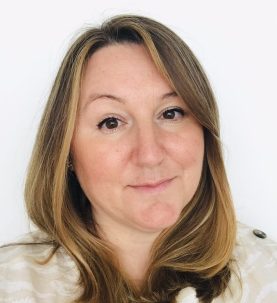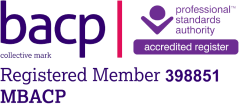Counselling & Psychotherapy in Warwickshire
Individual and Couples Therapy
People seek counselling for many reasons, and often the hardest decision is to start therapy
Hello and welcome,
I am a fully qualified and BACP registered Integrative Counsellor, providing Counselling and Psychotherapy in Leamington Spa, Warwickshire and UK Wide – online.
What does “integrative” mean? This means that I can alter my way of working to better suit my client’s personal needs. I can bring different theories and skills into session that I feel my client may benefit from rather than sticking to just one therapeutic theory.
I believe that a therapeutic journey needs to be as unique as the person embarking on it.
Whether you have had counselling before or you're new to it, I understand that it may seem daunting.
I provide a safe, confidential and non-judgmental space where you needs can be heard, respected and above all understood.
As a therapist, I don’t solve problems, our relationship isn’t about giving you advice, it’s about understanding you as a whole person and empowering you to make changes you want to.
I have a strong interest in the areas of emotional attachment, relationships and interpersonal dynamics
I find that how we relate with others and ourselves is at the heart of most struggles that people bring to therapy.
I am passionate about empowerment, self- care, personal boundaries and clear communication.
My aim is to help clients achieve a higher level of understanding in themselves and work through any difficulties they may be facing.
It's always such a humbling and rewarding experience to see the change in people, to witness their transformation into their authentic selves and transition into leading more of a fulfilling life with purpose.
I have experience across diverse clinical settings including working for NHS, the mental health organisation and low-cost services across London.
I now run my private practice in London and Warwickshire where I work with various difficulties.
"The curious paradox is that when I accept myself just as I am, then I can change." - Carl Rogers
Counselling and Psychotherapy
Counselling and Psychotherapy are therapeutic approaches aimed at helping individuals navigate psychological, emotional and behavioral changes. While often interchangeable,there are subtle differences between them.
Counselling usually refers to shorter–term more focused work, where you explore and gain insights into a particular issue. You can use counselling to develop strategies, actions and behaviours that can help make daily life more manageable and enjoyable.
Psychotherapy is more in-depth, longer–term process that facilitates long-term changes, focussing on deep-rooted feelings and past experience. It tends to help people deal with longstanding, complex issues and leads to personal growth.
Counselling and Psychotherapy can be used to treat a wide range of issues including; anxiety disorders, depression, low self esteem, obsessive compulsive disorder, post-traumatic stress disorder, eating disorders, drug misuse.
“People start to heal the moment they feel heard”
How I work
I use a range of different modalities such as; psychodynamic, person-centred therapy, attachment-based therapy, trauma-informed, CBT, Gestalt, solution focused therapy, working with inner child to build the therapy around you and what you need.
Working with the present
When we experience difficult thoughts and feelings, the first reaction is to get away and find some escape.
This could be in the form of alcohol, playing sports, watching TV, scrolling on social media and so on – anything that helps dull the pain. By working in the present, we can explore what needs to change for you. What is problematic and unsatisfying for you right now?
Working with the past
By exploring the past, it will help you to understand how your early relationships and events shaped your sense of self and the way in which you relate with others. This will help you to work through unresolved past issues that you may not be aware of.
Looking at the future
What do you want and what changes need to be made in your life to get where you want to be.
I am experienced in supporting people to explore and resolve a wide range of issues, including:
You may suffer from:
- Relationship problems.
- Stress and feeling overwhelmed.
- A lack of confidence and self- esteem.
- Anger issues.
- Dysfunctional family dynamics
- Issues at school or work
- Addiction.
- Obsessive thoughts and rumination.
- Symptoms like panic attack and anxiety.
- Bereavement and major life changes.
- Feeling of disconnection, depression and emptiness.
- Issues related to sexuality.
- Trauma and Post Traumatic Stress.
- Compulsive or destructive behaviours.
Perhaps you’d like to:
- Feel more secure in yourself, in relationships and at work.
- Learn to recognise and attend to your needs.
- Experience feeling “good enough”.
- Feel calmer and more at peace.
- Come to understand, know and accept yourself.
- Learn to trust your inner voice, strength and wisdom.
- Confident in setting boundaries.
- Make peace with painful parts of your past.
- Break free from patterns of behaviour that may keep you stuck.
- Develop a relationship where you feel seen, heard and understood
Brief description of different approaches that I may use in our session:
Psychodynamic therapy helps you understand your current feelings and behaviour are shaped by your past experiences, impulses and your unconscious mind. As your therapist, our relationship is critical and works on acceptance and trust. I encourage you to talk freely and openly to help you understand what you're feeling now, why you behave in a certain way and how this affects your relationship. I help you recognise, experience and understand your true, deep-rooted feelings to help you resolve them.
Ultimately, you gain a better insight into your life and the problems you're experiencing here and now. With this new perspective and understanding, you can change negative patterns to help you move forward. Psychodynamic therapy helps with many issues, including anxiety, depression, addiction and eating disorders.
Person-centred therapy is a type of psychotherapy that emphasises your subjective experience and your innate capacity for self-awareness and personal growth.
As you therapist, I focus on your needs and listen to you while providing a conducive environment for you to make decisions independently without judgement. The goal of this practice is personal growth, including increasing self-awareness, self-esteem, and self-acceptance and minimisation of negative feelings such as defences, regret, insecurities and guilt. This leads to improved emotional resilience and more meaningful relationships with others.
Gestalt therapy focuses on the immediate here and now - and how exploring this helps you. It looks at how your past affects and influences your feelings at this moment rather than how you felt back then. Its focus is to raise your immediate awareness of how you are while allowing you to experiment with different response methods.
I help you focus on the present to understand what is happening in your life and how it makes you feel and increase your awareness, freedom and self-direction. Rather than sitting still and talking, I may introduce a couple of exercises such as role play, empty chair, guided imagery or the use of props to help communication and understanding. Engaging in experiential exercises can be a wonderful way to open up and share, especially when it is difficult to find words.
This interactive and feedback driven experience can help with the most issues, including anxiety, low self – esteem, depression and relationship problems.
Attachment therapy explores how childhood experiences impact one's ability to form meaningful bonds as an adult. Attachment-based therapists work with anyone who needs help rebuilding trust in relationships. There are now four different attachment types: secure, avoidant, anxious and disorganised. Without a healthy foundation, we may grow up to become fearful, confused, and insecure.
We may explore your childhood in therapy and discuss your early relationship with your parents or caregiver – the overall family dynamics as you grew up and any significant childhood experiences. You may explore connections between your childhood and adult relationships—how the past may have influenced the present. We may discuss skills to improve relationships, emotions, and behaviours during therapy.
Attachment based therapy can be used to treat anxiety and depression, unsolved childhood trauma and relationship issues.
Inner child work is an approach to recognising and healing a childhood trauma. It recognises that our behaviour as an adult stems from our childhood experiences. Inner child work focuses on addressing our unmet needs by learning how to reparent ourselves.
To book an appointment, call Mia on 07712 132770.
Get in touch
Please fill out your details and provide an idea of your availability options (days and times) and I will call you (normally within 24 hours) to have a free introductory chat about what you would like your counselling to help with and to book in your initial assessment.
Please note, this is not an emergency mental health support service. If you are in crisis or need help urgently, please contact 999, 111, your GP or someone from your support network.
All enquires are usually answered within 24 hours, and all contact is strictly confidential.
Frequently asked questions
The first step is to get in touch over email or telephone. I'll get back to you within 24 hours and offer you various convenient time slots for a FREE 15-minute telephone consultation.
This is a great opportunity for you to get a sense of who I am, how I work and to ask any questions you may have. We can briefly explore what brings you to therapy, as well as your hopes and expectation and how I may help. Please note, there is no obligation to book session afterwards - it is just for you to see if you feel comfortable working with me. If we agree to work together then we book an initial session.
This first session is to take some personal details, medical history, background history and to talk about your present mental health and what is going on for you. It is also an opportunity for us to discuss what you are expecting from therapy and for you to ask any questions. We will then talk about your availability and the different therapy options in more detail and agree how to move forward.
I offer in person, telephone and online therapy. We can meet in person at my practice in Royal Leamington Spa or we can have our sessions remotely if that is more convenient.
- 11 Dormer Place, Leamington Spa, Warwickshire CV32 5AA.
Sessions are 50 minutes long. In person, sessions are weekly and at the same time.
Online sessions are more flexible, and they can be weekly or fortnightly. The length of the therapy varies according to your preference, I offer both short and long-term therapy.
- The standard fee for individual counselling is £65
- Couples Therapy session fee - £90
The fee is payable via online bank transfer on the day of our session.
In the event of cancellation, I ask that clients give at least 24 hours’ notice. Missed sessions without 24 hours’ notice are charged in full.

